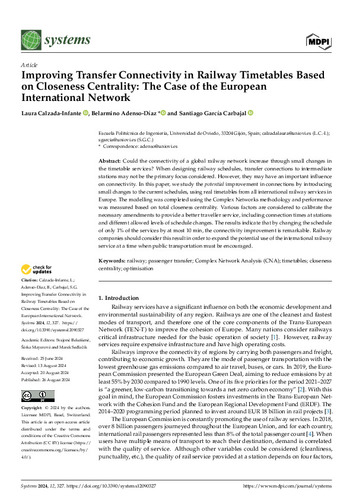Improving Transfer Connectivity in Railway Timetables Based on Closeness Centrality: The Case of the European International Network
Autor(es) y otros:
Palabra(s) clave:
railway
passenger transfer
Complex Network Analysis (CNA)
timetables
closeness centrality
optimisation
Fecha de publicación:
Editorial:
MDPI
Serie:
12;9
Resumen:
Could the connectivity of a global railway network increase through small changes in the timetable services? When designing railway schedules, transfer connections to intermediate stations may not be the primary focus considered. However, they may have an important influence on connectivity. In this paper, we study the potential improvement in connections by introducing small changes to the current schedules, using real timetables from all international railway services in Europe. The modelling was completed using the Complex Networks methodology and performance was measured based on total closeness centrality. Various factors are considered to calibrate the necessary amendments to provide a better traveller service, including connection times at stations and different allowed levels of schedule changes. The results indicate that by changing the schedule of only 1% of the services by at most 10 min, the connectivity improvement is remarkable. Railway companies should consider this result in order to expand the potential use of the international railway service at a time when public transportation must be encouraged.
Could the connectivity of a global railway network increase through small changes in the timetable services? When designing railway schedules, transfer connections to intermediate stations may not be the primary focus considered. However, they may have an important influence on connectivity. In this paper, we study the potential improvement in connections by introducing small changes to the current schedules, using real timetables from all international railway services in Europe. The modelling was completed using the Complex Networks methodology and performance was measured based on total closeness centrality. Various factors are considered to calibrate the necessary amendments to provide a better traveller service, including connection times at stations and different allowed levels of schedule changes. The results indicate that by changing the schedule of only 1% of the services by at most 10 min, the connectivity improvement is remarkable. Railway companies should consider this result in order to expand the potential use of the international railway service at a time when public transportation must be encouraged.
ISSN:
Colecciones
- Administración de Empresas [514]
- Artículos [37549]
Ficheros en el ítem





